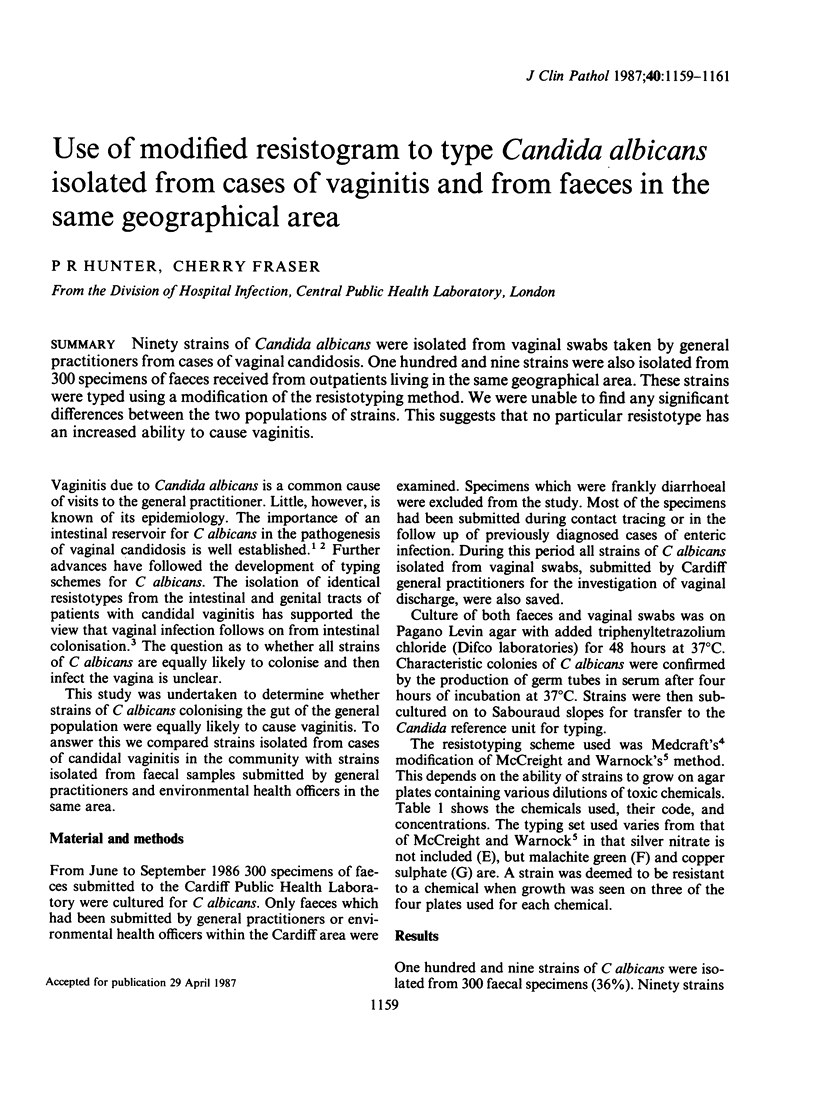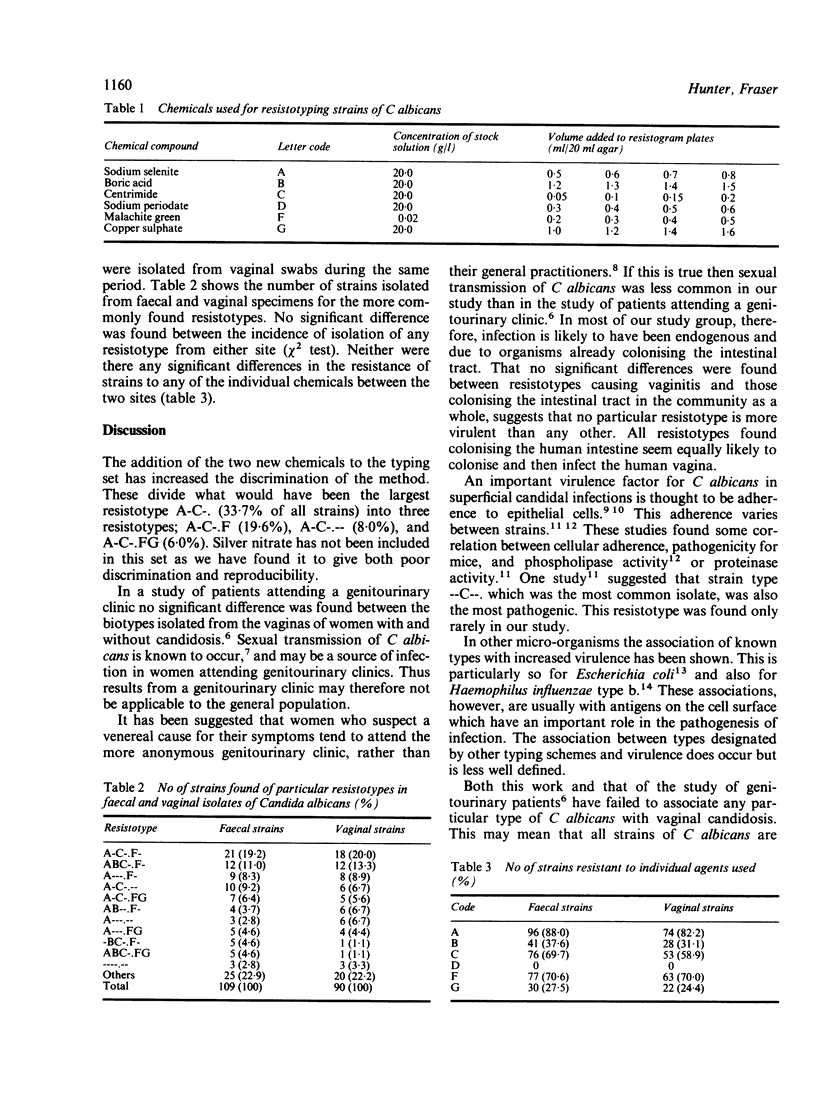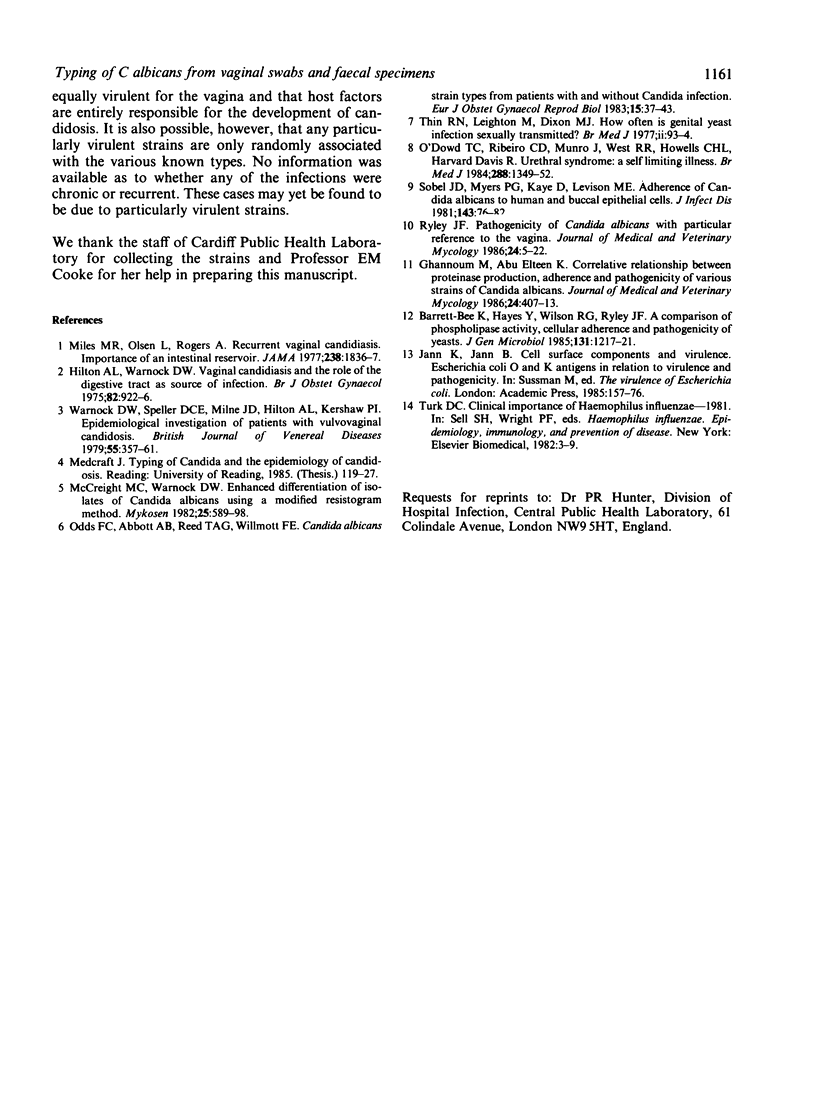Abstract
Ninety strains of Candida albicans were isolated from vaginal swabs taken by general practitioners from cases of vaginal candidosis. One hundred and nine strains were also isolated from 300 specimens of faeces received from outpatients living in the same geographical area. These strains were typed using a modification of the resistotyping method. We were unable to find any significant differences between the two populations of strains. This suggests that no particular resistotype has an increased ability to cause vaginitis.
Full text
PDF


Selected References
These references are in PubMed. This may not be the complete list of references from this article.
- Barrett-Bee K., Hayes Y., Wilson R. G., Ryley J. F. A comparison of phospholipase activity, cellular adherence and pathogenicity of yeasts. J Gen Microbiol. 1985 May;131(5):1217–1221. doi: 10.1099/00221287-131-5-1217. [DOI] [PubMed] [Google Scholar]
- Ghannoum M., Abu Elteen K. Correlative relationship between proteinase production, adherence and pathogenicity of various strains of Candida albicans. J Med Vet Mycol. 1986 Oct;24(5):407–413. doi: 10.1080/02681218680000621. [DOI] [PubMed] [Google Scholar]
- Hilton A. L., Warnock D. W. Vaginal candidiasis and the role of the digestive tract as a source of infection. Br J Obstet Gynaecol. 1975 Nov;82(11):922–926. doi: 10.1111/j.1471-0528.1975.tb00599.x. [DOI] [PubMed] [Google Scholar]
- McCreight M. C., Warnock D. W. Enhanced differentiation of isolates of Candida albicans using a modified resistogram method. Mykosen. 1982 Nov;25(11):589–598. doi: 10.1111/j.1439-0507.1982.tb01926.x. [DOI] [PubMed] [Google Scholar]
- Miles M. R., Olsen L., Rogers A. Recurrent vaginal candidiasis. Importance of an intestinal reservoir. JAMA. 1977 Oct 24;238(17):1836–1837. doi: 10.1001/jama.238.17.1836. [DOI] [PubMed] [Google Scholar]
- Nuessen M. E., Jeska E. L. The involvement of sugars and Mg++ in the attachment of phagocytic cells to Ascaris suum juveniles. J Infect Dis. 1981 Jan;143(1):71–75. doi: 10.1093/infdis/143.1.71. [DOI] [PubMed] [Google Scholar]
- O'Dowd T. C., Ribeiro C. D., Munro J., West R. R., Howells C. H., Davis R. H. Urethral syndrome: a self limiting illness. Br Med J (Clin Res Ed) 1984 May 5;288(6427):1349–1352. doi: 10.1136/bmj.288.6427.1349. [DOI] [PMC free article] [PubMed] [Google Scholar]
- Odds F. C., Abbott A. B., Reed T. A., Willmott F. E. Candida albicans strain types from the genitalia of patients with and without Candida infection. Eur J Obstet Gynecol Reprod Biol. 1983 Apr;15(1):37–43. doi: 10.1016/0028-2243(83)90295-2. [DOI] [PubMed] [Google Scholar]
- Ryley J. F. Pathogenicity of Candida albicans with particular reference to the vagina. J Med Vet Mycol. 1986 Feb;24(1):5–22. [PubMed] [Google Scholar]
- Thin R. N., Leighton M., Dixon M. J. How often is genital yeast infection sexually transmitted? Br Med J. 1977 Jul 9;2(6079):93–94. doi: 10.1136/bmj.2.6079.93. [DOI] [PMC free article] [PubMed] [Google Scholar]
- Warnock D. W., Speller C. D., Milne J. D., Hilton A. L., Kershaw P. I. Epidemiological investigation of patients with vulvovaginal candidosis. Application of a resistogram method for strain differentiation of Candida albicans. Br J Vener Dis. 1979 Oct;55(5):357–361. doi: 10.1136/sti.55.5.357. [DOI] [PMC free article] [PubMed] [Google Scholar]


